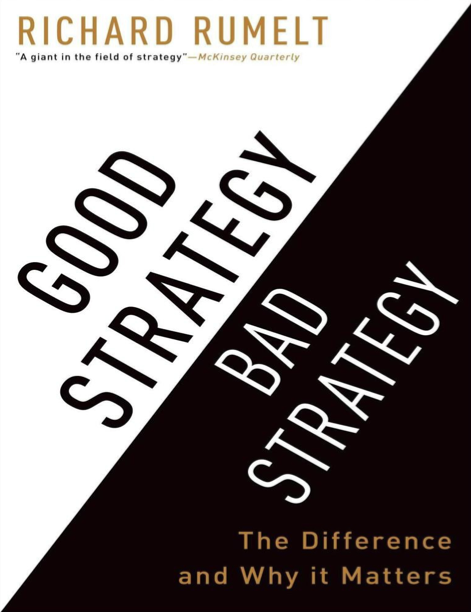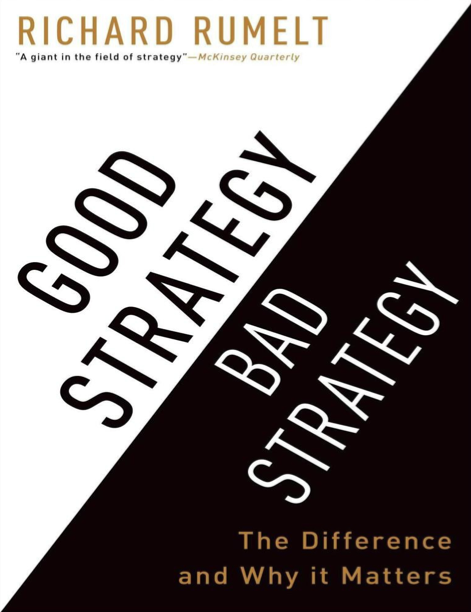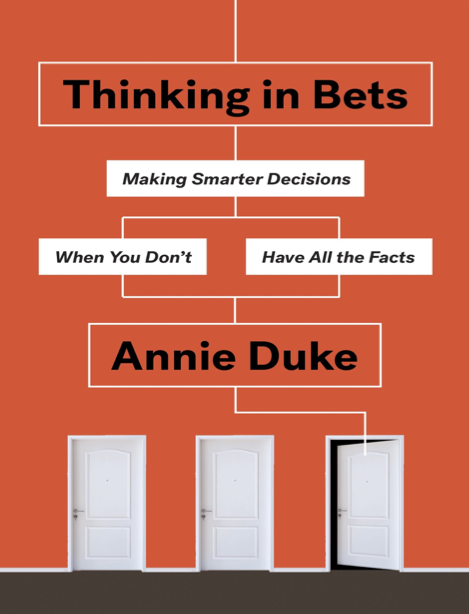Good Strategy Bad Strategy: The Difference and Why It Matters | Richard Rumelt
![]()
![]()
Richard Rumelt Strategic Business Planning Systems & Planning Business Management Business Systems & Planning Business Decision-Making Management & Leadership Business Decision Making & Problem Solving Business & Money
- درباره کتاب
- مطالعه راحت
- بخشی از کتاب
- نسخه چاپی فارسی
- نظرات
Good Strategy/Bad Strategy clarifies the muddled thinking underlying too many strategies and provides a clear way to create and implement a powerful action-oriented strategy for the real world.
Developing and implementing a strategy is the central task of a leader. A good strategy is a specific and coherent response to—and approach for—overcoming the obstacles to progress. A good strategy works by harnessing and applying power where it will have the greatest effect. Yet, Rumelt shows that there has been a growing and unfortunate tendency to equate Mom-and-apple-pie values, fluffy packages of buzzwords, motivational slogans, and financial goals with “strategy.”
In Good Strategy/Bad Strategy, he debunks these elements of “bad strategy” and awakens an understanding of the power of a “good strategy.” He introduces nine sources of power—ranging from using leverage to effectively focusing on growth—that are eye-opening yet pragmatic tools that can easily be put to work on Monday morning, and uses fascinating examples from business, nonprofit, and military affairs to bring its original and pragmatic ideas to life. The detailed examples range from Apple to General Motors, from the two Iraq wars to Afghanistan, from a small local market to Wal-Mart, from Nvidia to Silicon Graphics, from the Getty Trust to the Los Angeles Unified School District, from Cisco Systems to Paccar, and from Global Crossing to the 2007–08 financial crisis.
Reflecting an astonishing grasp and integration of economics, finance, technology, history, and the brilliance and foibles of the human character, Good Strategy/Bad Strategy stems from Rumelt’s decades of digging beyond the superficial to address hard questions with honesty and integrity.
Editorial Reviews
Amazon.com Review
Clears out the mumbo jumbo and muddled thinking underlying too many strategies and provides a clear way to create and implement a powerful action-oriented strategy for the real world
Developing and implementing a strategy is the central task of a leader, whether the CEO at a Fortune 100 company, an entrepreneur, a church pastor, the head of a school, or a government official. Richard Rumelt shows that there has been a growing and unfortunate tendency to equate Mom-and-apple-pie values, fluffy packages of buzzwords, motivational slogans, and financial goals with “strategy.” He debunks these elements of “bad strategy” and awakens an understanding of the power of a “good strategy.”
A good strategy is a specific and coherent response to—and approach for overcoming—the obstacles to progress. A good strategy works by harnessing and applying power where it will have the greatest effect in challenges as varied as putting a man on the moon, fighting a war, launching a new product, responding to changing market dynamics, starting a charter school, or setting up a government program. Rumelt’s
nine sources of power—ranging from using leverage to effectively focusing on growth—are eye-opening yet pragmatic tools that can be put to work on Monday morning.
Surprisingly, a good strategy is often unexpected because most organizations don’t have one. Instead, they have “visions,” mistake financial goals for strategy,
and pursue a “dog’s dinner” of conflicting policies and actions.
Rumelt argues that the heart of a good strategy is insight—into the true nature of the situation, into the hidden power in a situation, and into an appropriate response. He shows you how insight can be cultivated with a wide variety of tools for guiding your
own thinking.
Good Strategy/Bad Strategy uses fascinating examples from business, nonprofit, and military affairs to bring its original and pragmatic ideas to life. The detailed examples range from Apple to General Motors, from the two Iraq wars to Afghanistan, from a small local market to Wal-Mart, from Nvidia to Silicon Graphics, from the Getty Trust to the Los Angeles Unified School District, from Cisco Systems to Paccar, and from Global Crossing to the 2007–08 financial crisis.
Reflecting an astonishing grasp and integration of economics, finance, technology, history, and the brilliance and foibles of the human character, Good Strategy/Bad Strategy stems from Rumelt’s decades of digging beyond the superficial to address hard questions with honesty and integrity.
Amazon Exclusive: Walter Kiechel Reviews Good Strategy Bad Strategy
Walter Kiechel is the author of The Lords of Strategy. Until January 2003, Kiechel served as editorial director of HBP and senior vice president in charge of its publishing division, with responsibility for the Harvard Business Review; HBS Press, the company's book-publishing arm; the newsletter unit (which he helped start in 1996) as well as HBP’s video, reprints, and conference businesses
Considering the source, this is a shocking book. For over 40 years Richard Rumelt has made distinguished contributions to the field of strategy, in his theorizing, teaching, and consulting. Now comes the deponent to tell us that what purports to be strategy at most organizations, not just companies but not-for-profits and governments as well, hardly merits the name. Instead it represents what he calls "bad strategy"--a list of blue-sky goals, perhaps, or a fluff-and-buzzword infected "vision" everybody is supposed to share.
Refreshing stuff this, seeing the corporate emperor revealed not in his imagined suit of armor but rather in something resembling a diaphanous clown suit. Rumelt drives the point home with a simple explanation for why most organizations can't do "good strategy": the real McCoy requires making choices, feeding a few promising beasties while goring the oxen of others at the management table.
But the jeremiad, fun as it is--and it is fun, Rumelt has a good time punching holes in the afflatus of bad strategy--isn't my favorite part of the book. That would be the second section, with the slightly daunting title "Sources of Power." To be useful to a practitioner, a book on strategy needs not only a straightforward framework but also a certain craftiness, a set of ideas that prompt the reader to think "What a neat idea" or "How clever of them." Rumelt has the clear, elegant framework in what he calls the "kernel"--a diagnosis explaining the nature of the challenge, a guiding policy for dealing with it, coherent actions for carrying out the policy.
In "Sources of Power," though, he goes deeper than the merely crafty to identify potential levers of for strategic advantage--proximate objectives, design, and focus, among others--that transcend the purely economic. Repeatedly he demonstrates how to think down through the apparent challenge, with questions and then questions of those questions, to get at what can be the bedrock of a good strategy.
In a final section on thinking like a strategist, we get a sense of what a delight it must be to sit in Rumelt's classroom, or with him on a consulting assignment, as he leads us through the best kind of Socratic dialogue to appreciate the kinds of blinders or mass psychology that can pose the final barriers to our forging clear-eyed strategy.
If you want to make strategy, or be an informed part of the ever-evolving conversation around the subject, you will need to read this book. My bet is that you'll enjoy the experience. --Walter Kiechel
Review
"The most interesting business book of 2011." --Financial Times
“So much that’s said and written about strategy is – from my point of view – complete junk, that I get excited when I hear someone focusing on strategy in a coherent and useful way...A very good book.” --Forbes
“The year’s best and most original addition to the strategy bookshelf." --Strategy+Business
"The whole middle section, about sources of power, is valuable—particularly the explication of the limitations and nuances of competitive advantage.” --Inc
"Clearly written, thoughtful...This book is painful therapy but a necessary read nonetheless." --Washington Times
"Represents the latest thinking in strategy and is peppered with many current real world examples. Good Strategy/Bad Strategy has much to offer and has every chance of becoming a business classic.” --Management Today
"Drawing on a wealth of examples, Rumelt identifies the critical features that distinguish powerful strategies from wimpy ones—and offers a cache of advice on how to build a strategy that is actually worthy of the name. If you're certain your company is already poised to out-perform its rivals and out-run the future, don't buy this book. If, on the other hand, you have a sliver of doubt, pick it up pronto!” --Gary Hamel, co-author of Competing for the Future
“..Brilliant … a milestone in both the theory and practice of strategy... Vivid examples from the contemporary business world and global history that clearly show how to recognize the good, reject the bad, and make good strategy a living force in your organization.” --John Stopford, Chairman TLP International, Professor Emeritus, London Business School
“… Penetrating insights provide new and powerful ways for leaders to tackle the obstacles they face. The concepts of "the kernel" and "the proximate objective" are blockbusters. This is the new must-have book for everyone who leads an organization in business, government, or in-between.” --Robert A. Eckert, chairman and CEO of Mattel
“…. Richly illustrated and persuasively argued … the playbook for anybody in a leadership position who must think and act strategically. “ --Michael Useem, Professor of Management at the Wharton School, University of Pennsylvania, and author of The Leadership Moment
“… Rumelt writes with great verve and pulls no punches as he pinpoints such strategy "sins" as fluff, blue sky objectives, and not facing the problem.” --James Roche, former Secretary of the Air Force and president of Electronic Sensors & Systems, Northrop Grumman.
“This is the first book on strategy I have read that I have found difficult to put down. --John Kay, London Business School
About the Author
RICHARD P. RUMELT is one of the world’s most influential thinkers on strategy and management. The Economist profiled him as one of twenty-five living persons who have had the most influence on management concepts and corporate practice. McKinsey Quarterly described him as being “strategy’s strategist” and as “a giant in the field of strategy.” Throughout his career he has defined the cutting edge of strategy, initiating the systematic economic study of strategy, developing the idea that companies that focus on core skills perform best, and that superior performance is not a matter of being in the right industry but comes from a firm’s individual excellence. He is one of the founders of the resource-based view of strategy, a perspective that breaks with the market-power tradition, explaining performance in terms of unique specialized resources. Richard Rumelt received his doctoral degree from Harvard Business School, holds the Harry and Elsa Kunin Chair at the UCLA Anderson School of Management, and is a consultant to small firms such as the Samuel Goldwyn Company and giants such as Shell International, as well as to organizations in the educational and not-for-profit worlds.
با وجود اینکه هنوز بسیاری از کتابخوانها [ی حرفهای] ترجیح میدهند از کتاب چاپی برای مطالعه استفاده کنند ولی شمار کتابخوانهایی که بهتدریج از کتاب الکترونیک به عنوان مکمل یا منبع اصلی مطالعه استفاده میکنند کم نیست. فارغ از نوآوریهای جالبتوجه در زمینهی کتابخوانهایی همانند Kindle کمپانی آمازون، امکان و قابلیت نرمافزاری ساده، کارآمد و در دسترس مطالعهی کتاب با فرمت ePub از نظر بسیاری از کتابخوانها دور مانده است؛ بر اساس تجربهی مستقیم ما، شاهد بودهایم که بسیاری از افرادی که به صورت حرفهای به دنبال کتابهای زبان اصلی برای مطالعه روی کامپیوتر، تبلت و موبایل خود هستند با فرمت ePub آشنایی درستی ندارند.
پر واضح است که لمس کتاب بهصورت فیزیکی و بوی خوش کاغذ تجربهای لذتبخش و بیمانند است که همچنان در بین کتابخوانهای حرفهای در سراسر دنیا هواداران بسیاری دارد. البته، وقتی یکی از دغدغههای کتابخوان سهولت مطالعهی کتاب تحت هر شرایطی باشد اینجاست که نیاز به استفاده از کتاب الکترونیک حس میشود. با توجه به ویژگیهای مناسب کتابهای الکترونیک با فرمت ePub نگرانی ضعیف شدن بینایی و خستگی چشم بر اثر نگاه مستقیم به صفحهی نمایش تا حد بسیار زیاد و قابلتوجهی کاسته میشود.
کتاب الکترونیک با فرمت ePub این قابلیت را به خواننده میدهد تا بتواند رنگ زمینه، نوع فونت و سایز فونت را برای مطالعهی کتاب خود انتخاب کنند. همچنین خواننده این امکان را دارد که روی نوشته یادداشت بنویسد، جملهای را هایلایت کند و یا صفحه یا صفحاتی از کتاب را بوکمارک کند.
خوشبختانه نرمافزارهای کتابخوان الکترونیکی رایگان بسیاری وجود دارد که از فرمت PDF و ePub پشتیبانی میکنند. این کتابخوانهای الکترونیک قابل نصب روی انواع موبایلهای اندرویدی، آیفون، لپتاپهای ویندوزی و مکبوک است.
:این کتاب توسط ۱ ناشر منتشر شده است
نشر آریانا قلم | استراتژی خوب/استراتژی بد | ترجمه بابک وطندوست










هنوز نظری ثبت نشده
اولین نفری باشید که نظر میدهید
ثبت نظر